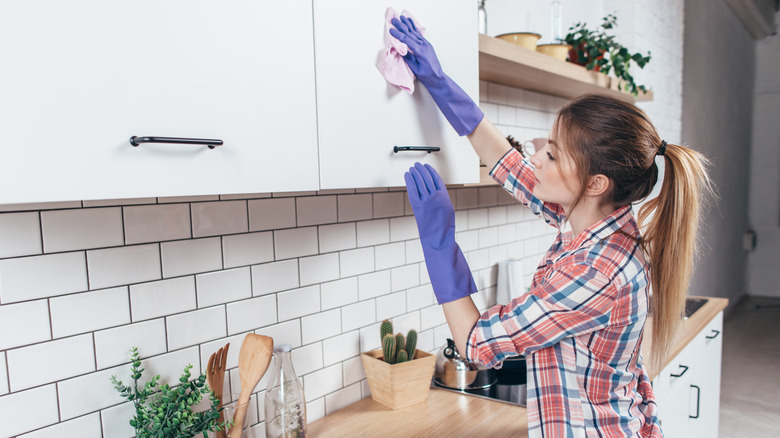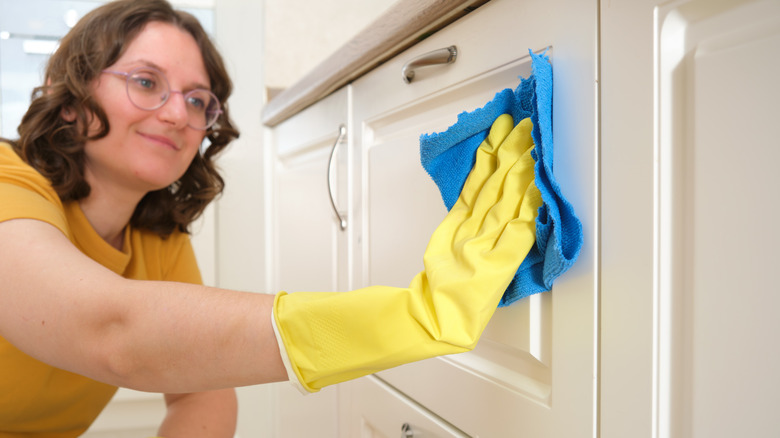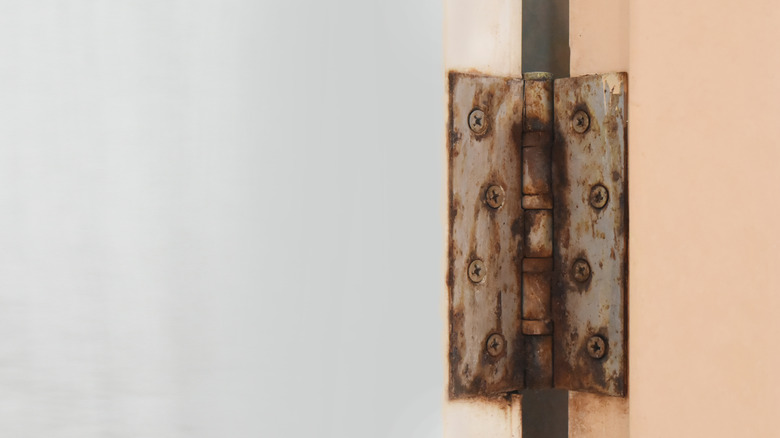The Cleaning Mistake That's Making Your Kitchen Cabinet Hardware Rust
Part of maintaining a healthy and welcoming kitchen is regularly cleaning your space, including the cabinets. One factor that many homeowners overlook is improperly cleaning your kitchen cabinets can lead to rusty hinges. Using too much water when cleaning cabinets allows moisture to seep into the crevices of the hinges, fostering a perfect environment for the metal to oxidize and form rust. Some materials, like iron or steel, are much more prone to rust. If your hinges are made of these metals, then it's more likely that they will become rusty if they're improperly cleaned.
While a little rust on your cabinet hinges might not seem like a big deal, it can be detrimental to the longevity of the cabinets. Rust will weaken the structural integrity of the hinges, making them more susceptible to breaking, sticking, or working improperly. As a result, your cabinets may be more difficult to open and close, causing frequent headaches when you're cooking in the kitchen. Another issue is that the rust spreads easily from the hinges to other parts of the cabinets. This may be a particular issue if you have lightly colored cabinets — rust will impact how they look much more and faster than darker cabinets. Finally, rust will eventually corrode metal hinges, which could require costly repairs or replacements.
How to properly clean kitchen cabinets
One of the best ways you can prevent rust from forming on your kitchen cabinet hinges is by cleaning them properly. Depending on the make and finish of your cabinets, you can choose from hot, soapy water; vinegar and water; or baking soda and water. Harsh chemical cleaners are not necessary, even for thick grease and grime. Use one of these easy, gentler DIY solutions instead.
You can start by vacuuming your cabinets, especially if the tops don't meet your ceiling. This allows you to remove any dust or debris that may be lurking out of sight. Next, you can choose the best DIY combo for your cabinets and mix them together in a small bowl. Add it to a spray bottle and spray the solution into a soft cloth rather than on the cabinets. This will reduce the amount of moisture on the cabinets and help to prevent rust from forming. For tough spots or grooved cabinets, you can even use a toothbrush to get into those spaces. Wipe them down with a microfiber cloth to soak up any remaining moisture or cleaning solution. Finally, to help prevent rust from forming, consider applying a layer of protective wax or oil on the hinges and other metal pieces to repel moisture in between cleanings and from natural kitchen humidity.
What to do if your cabinet hardware has rusted
While properly cleaning your cabinets to reduce the amount of lingering moisture can help prevent rust, kitchens are known to be humid and the hardware may be at risk just from normal everyday use. As a result, your cabinets may become rusty despite best efforts to protect them. Fortunately, there are ways to combat this rust and remove it so that your cabinets can continue functioning normally. To get started, you'll need to remove the cabinet doors and then separate the hardware. Fill a small bowl with equal parts water and vinegar and soak the hinges in it for 30 minutes to allow the acid in the vinegar to remove the rust.
Remove the hinges and rinse them in clean water. Then you'll need to assess whether the vinegar successfully removed the rust. If the rust flakes away, you can continue to clean any remaining rust with a soft brush, using additional vinegar if necessary. Rinse when done, then dry completely with a microfiber cloth or even a hair dryer if any places are difficult to reach. If the rust seems deeper and won't flake away, then the hinges probably need to be replaced. But if the rust flakes off like it's supposed to, reattach the hinges to the cabinetry and reinstall them carefully. Then use wax or oil to help prevent future rust from forming on the metal components.


